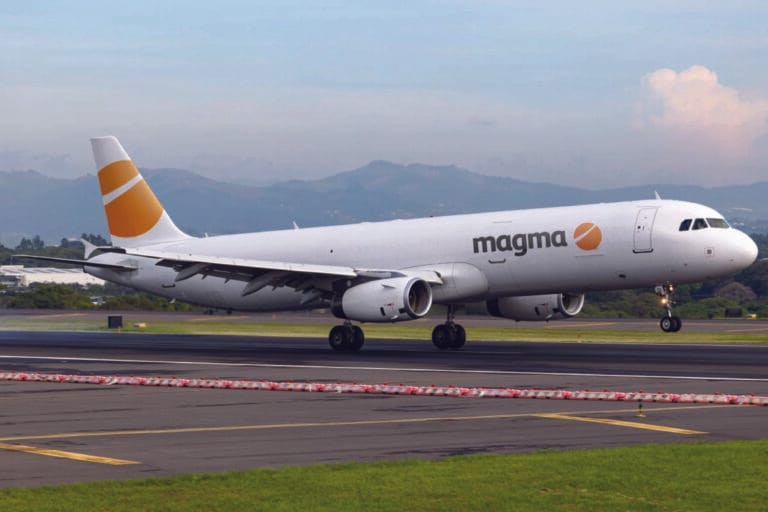- Strategic expansion into Asia: Magma Aviation is targeting Southeast Asia, including Malaysia, Vietnam, and China, with potential Asia–Africa routes, balancing growth with market discipline amid falling China freight rates and limited passenger-to-freighter conversions.
- Fleet growth with financial prudence: The airline plans to expand to 14 aircraft over five years but avoids inflated leasing costs, prioritising sustainable economics over rapid capacity deployment.
- GSA-driven commercial strategy: Magma leverages GSAs in the US and Southeast Asia to provide flexible, tailored solutions for both independent and multinational freight forwarders, emphasising service over scale.
- Sustainability through service and operational resilience: Magma focuses on reliable, flexible operations to sustain routes long-term, addressing customer needs while navigating evolving emissions mandates and rising cargo theft risks.
Magma Aviation is preparing for a new phase of growth as it pivots toward Asia, even as market conditions test the resilience of cargo operators worldwide. Magma Aviation’s CEO Peter Kerins says the carrier will balance the company’s ambition with discipline, expanding its fleet and network while avoiding the pitfalls of inflated leasing costs and overexposure to volatile trade lanes.“You were looking at COVID pricing almost for aircraft lease,” said Magma CEO Peter Kerins, recalling the leasing bubble during the 2023 cargo boom. “That’s not sustainable.”
The carrier is due to take delivery of its fourth aircraft this month, with options for two more by year-end. In a longer term, the ambition is to expand our fleet to as many as 14 aircraft over the next five years. But with freight rates out of China, which is about 30% lower than a year ago and a shortage of passenger-to-freighter conversion slots, growth will depend as much on market discipline as on ambition.
Magma was built around West Africa, with early 747F services linking Europe, Lagos, and Nairobi. That model has since changed.
“There were routes that we would fly today, that maybe weren’t the most profitable… there was history involved,” Kerins said. “So we removed a lot of those in late 2024. That freed up capacity on the aircraft we already had and allowed us to redeploy into different markets because airfreight is constantly changing.”
Those markets now include Southeast Asia. “We’re looking at places like Malaysia and Vietnam, and we’ll begin two flights to China, operating both into and out of Hong Kong. We also plan to possibly launch an Asia–Africa route in the fourth quarter of this year.”
The decision not to chase the China boom now looks well-judged. “We looked at last year’s China surge and chose not to put all our capacity there, because we didn’t think it would last. And rightly so – the volumes are still there, but the yields have fallen significantly.”
Aircraft growth versus market reality
Fleet expansion is central to Kerins’ strategy, but he insists Magma will not be drawn into inflated leasing deals. “We want to build a fleet of up to 14 aircraft over the next four or five years, but it has to be at the right rate. We cannot pay inflated prices because of what’s happening in markets today.”
“Volumes are still increasing on certain lanes, but rates are falling. If you look at China-to-America or China-to-Europe, they’re down about 30% compared with this time last year. Paying high lease costs on aircraft in that environment is not sustainable.”
That tension between ambition and economics mirrors wider pressures in the sector. With freighter conversions backlogged and ACMI demand high, carriers like Magma must find aircraft without exposing themselves to unsustainable cost bases. Kerins’ mitigation strategy is to diversify risk: “If we put it all our capacity into one region, it can be very risky. So we try and mitigate that by development of new routes and the development of new partnerships.”
Commercial strategy
Kerins’ background is in GSAs, and Magma’s current shift relies heavily on them. “We’ve worked with GSAs for a long time and they represent the values of Magma, and we’ve never really gone beyond Central Europe. So now we’ve appointed a GSA in the US, and we will appoint in six countries in Southeast Asia over the coming months”
For Kerins, the model is not about handing out tariffs. “It’s not a case of just appointing a GSA for an airline and them handing out tariffs anymore. They’re the face of your airline.” The strategy is designed to support smaller forwarders as much as multinationals. “Especially for independent, single-owned freight forwarders. They may need solutions beyond a single destination. We can provide that.”
The wider question is whether this middle-market focus is sustainable at a time when multinational forwarders are consolidating share and digital platforms are gaining ground. Magma is betting that flexibility, not scale, will be its competitive edge.
Sustainability through service
Asked about sustainability, Kerins was blunt. “Service leads to sustainability on our routes. You know that we do for people, the flexibility that we show, the service that we give people – that allows us to sustain business on the long-term.”
That practical approach reflects Magma’s operational culture, but sits from the broader industry debate on SAF blending and emissions reporting. With EU mandates tightening and shippers under pressure to decarbonise supply chains, whether “service sustainability” will be enough is an open question.With cargo theft soaring to record levels, the industry faces a simple choice: invest in verification at every hand-off, or risk multimillion-dollar losses in minutes. In a business where a single pallet can equal a year’s margin, authenticating both people and documents may well be the most valuable piece of ground equipment on the ramp.





